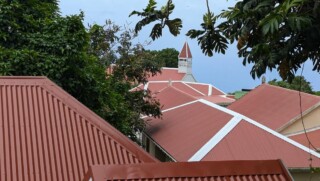Foster children in the Caribbean Netherlands receive half less than in the Netherlands
By Caribisch Netwerk| Jacqueline Hooftman

Kralendijk – If you want to take care of a foster child in a Dutch Caribbean municipality, you get 9.47 dollars a day. On St. Eustatius you can only buy a pack of milk and six eggs.
“It does not do justice to the needs of the child, especially children on the Windward Islands, where life is a lot more expensive than on Bonaire”, says Curvin George, Director Youth Care and Family Guardianship. The reimbursements in the European Netherlands are, depending on the age of the child, twice the daily allowance that children receive in the Caribbean Netherlands.
The Hague recognizes that new policy must be introduced. State Secretary for Health, Welfare and Sport Paul Blokhuis has asked the Director of Youth Care for advice. But the fact that the compensation is equalized does not seem plausible, because this also did not happen with the child benefit and the subsistence minimum.
‘Taking care of a child in a Caribbean municipality with less than ten dollars a day is impossible’
“On Bonaire there are 55 foster families with a total of 66 foster children. On St. Eustatius three foster children live together in a house, the family has a hard time. The prices in the supermarket almost doubled after October 10, 2010”, explains an employee of the directorate Social Wellbeing in Oranjestad, Sint-Eustatius. When asked if you can care for a child with less than ten dollars per day, she replies: “Impossible!”
Whether or not an increase, the reimbursement for the care of about 75 foster children on Bonaire, St. Eustatius and Saba will continue to exist. In June of this year panic broke out on the islands when media reported that the Rijksdienst Caribisch Nederland (RCN) had decided to stop the compensation. “That is not true,” emphasizes Curvin George, Director of Youth Care and Family Guardianship. “We have had to talk a lot to take away the panic of the families involved.”
‘The situation on the islands is more complex than in the Netherlands’
Apart from the fees, there are also other differences for residents of Dutch and Caribbean municipalities. For example, the Youth Act has been applicable in the European Netherlands since 1 January 2015. As a result, the administrative and financial responsibility for youth care came to lie with Dutch municipalities. The government has opted to reduce the demand for youth care by means of prevention and early intervention.
“But the situation on the islands is more complex than in the Netherlands’, Curvin George explains. “The Dutch Youth Act is not directly applicable here. There must be policies that meet the needs of the children in the Caribbean Netherlands. That means you also have to help the parents, that they must have the tools to take care of their children.”
No Youth Act, but supervision
Since the spring of 2016, the islands have received supervision of youth care. The Health Care and Youth Inspectorate monitors Youth Care and Family Guardianship Caribbean Netherlands, which is led by Curvin George.
In consultation with the foster parents, Jeugdzorg and Gezinsvoogdij have identified the care demand and joint recommendations have been drawn up. “The most important thing is that children must be able to grow up in a family, we want to avoid receiving care at a boarding school. Most children have attachment disorders and it is important that they have the opportunity to strengthen the bond with family. “












